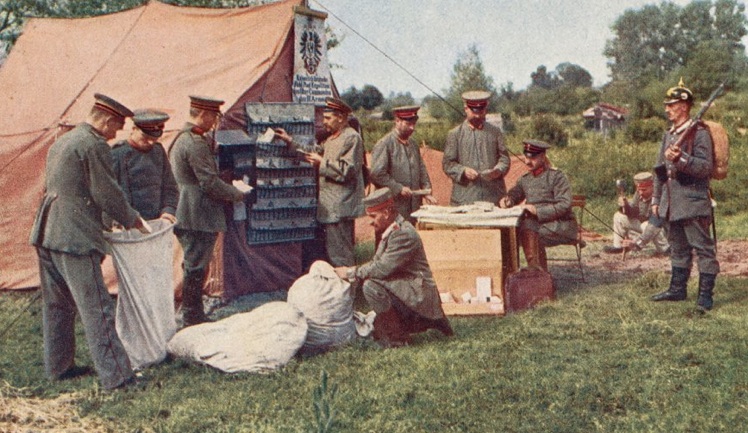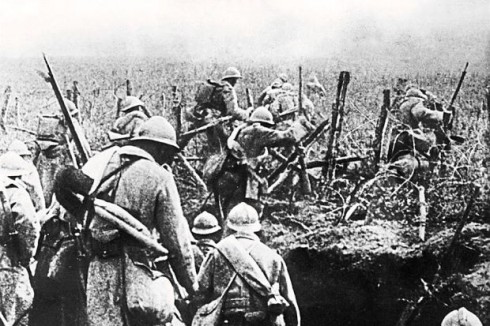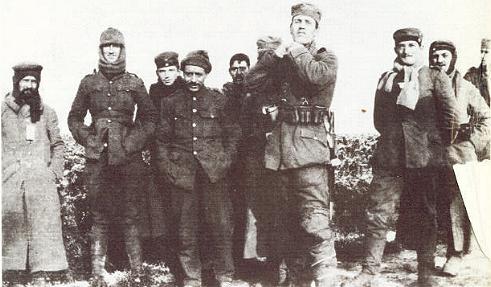As described in the previous post The Marked Year 1914 , many historians and analysts have declared that 1914 was a turning point in human history. At the close of centenary year 2014, here are more. For instance, columnist Joe Chapman writing in The Spectator of Hamilton, Ontario:
“How innocent, how mercifully ignorant, was the world of August, 1914! And yet, in many ways, the First World War, in a macabre sense at least, may well deserve the title ‘great’. It was the first war which could, with justification, be called a world conflict, involving nearly every important nation, with campaigns fought on many fronts, from Arctic wastes to steaming jungles. It was the first ‘total’ war, in which the whole nation became deeply involved, with the entire apparatus of civilian life becoming an integral part of the war effort. It was the first war in which technology played such an important part. No other war saw the introduction of so many new weapons used on a large scale: The machine-gun, the tank, the airplane, the submarine, poison gas, motor transport, telephones and other items, and artillery used on a truly grand scale. In short, it was the first of our modern wars.”
Columnist Chapman also remarked that “the war was a turning point in more than a military and technological sense. It was a social and cultural revolution and the old way of life was shattered utterly.” After reflecting on “the pre-1914 world” and the changes since then, he said regarding the impact of World War I on society:
“Not even the Second World War, to which the Nazis added new dimensions of brutality, and the atomic bomb slaughter, seems to have had such an effect upon us as did the First World War. Somehow, we had become conditioned to the idea of total war and numbed by history, and not even Hiroshima or Dresden had the same impact as the awful carnage of the Western Front. Perhaps that is why the veterans of the earlier struggle seemed men set apart, much less able to adjust to the new world than those from 1945. Nothing in their lives had prepared them for the reality of the trenches and nothing since has equalled their experiences.”
Then, describing the innocence of those who went off to the war in 1914, Chapman commented:
“It was all a kind of a lark but the awakening would come soon enough and they and their world would never be the same again. Indeed, in more than one sense, their world came to an end (100) years ago; it took the rest of us a little longer to begin to understand.”
Note the following summary of the rapid fire of events after the summer of 1914.
“Austria declared war on Serbia July 28, 1914… Germany demanded neutrality of Britain in event of war with Russia and France; offered to respect French territory but gave no promise on colonies; Britain refused to bargain, July 30. Austria now agreed to negotiate with Russia. Russia mobilized in part, declaring Hungarian mobilization was directed against it; Germany mobilized, declaring such Russian action was against Germany. In this tense situation Britain continued efforts to stop general war. While Russia and Austria were conferring, Germany sent an ultimatum to Russia demanding the end of mobilization in twelve hours. The Czar asked for the Austro-Serb quarrel to be submitted to The Hague (arbitrators of international law); no reply. Germany declared war against Russia August 1; against France August 3. Germans enter Belgium, in violation of the treaty guaranteed by Britain. Britain asked Germany to guarantee neutrality of Belgium by midnight August 4; Germany refused. Britain declared war August 4. Italy was bound to Germany and Austria in the Triple Alliance, but proclaimed neutrality; they had a secret understanding with France not to join in any war against France. Italy declared war against Austria-Hungary May 23, 1915; against Germany August 27, 1916. Turkey, Bulgaria, Rumania joined the Central Powers. Japan declared war on Germany, August 23, 1914. The United States declared war existed with Germany, April 6, 1917.” (The World Almanac, 1951, pp. 188,189)
In the volume Advance to Barbarism: The Development of Total Warfare from Sarajevo to Hiroshima , lawyer Frederick Veale, wrote “the whole character of warfare and of international relations has been completely transformed since 1914. What is so remarkable about this development is that it ran entirely contrary to the previous trend of events. Through the ages, down to 1914, with certain temporary fluctuations, manners generally had become steadily milder and in warfare, in particular, the methods of primitive savagery had become gradually modified by an increasing collection of restrictions and restraints. Compliance with these restrictions and restraints is commonly held to mark the distinction between savage and civilized warfare. . . . A code of conduct was gradually established which became formally recognized by all civilized countries. A history of warfare, written in 1913, would be a simple record of this slow and fluctuating, but on the whole steady, progress. . . . Such a sudden and complete reversal of the process of gradual ameliorating of warfare which had been going on for more than two thousand years surely calls for some explanation. Is not, for once, the overworked description of ‘epoch-making’ merited?”
Elmer Davis, writing in the book Two minutes till midnight, shows that our unique time began in 1914:
“A Rip van Winkle who had gone to sleep in the early summer of 1914 and woke up now would feel that he had emerged into a world of barbarism—a sophisticated and streamlined barbarism, of high technical competence, but barbarism none the less by contrast with the world he had known. There were tyrannies then, but very feeble and ineffective beside the tyrannies of today; and even before the fission or fusion bombs were invented, the free world had condoned methods of war-making which until August 1914 had seemed forever abandoned as unworthy of civilized man. But the code then existing was shattered by the Germans—not the nihilistic Nazis, but the respectable Christian Germans of the Kaiser’s Reich; and once they had done what they thought might help them win, their opponents imitated them—as they always will.”
Ewart Chitty was 16 when the war broke out. “It was a different world before 1914,” he recalls. “There was a general sense of security that is lacking today. You took security for granted.” How many people take security for granted today?
“I was in Vienna, Austria, when the war began,” says Maxwell Friend, born in 1891. “People were changed by it. They became very patriotic and nationalistic. Many were hardened. I remember the refugees streaming into Vienna from the east, fleeing before the Russian army. They had lost everything, even their tears. They had wept until there were no more tears.”
Imagine the scars left on those who survived World War I, a war unlike anything in human history. “England was bled white,” says Ewart Chitty, who was in London at the time. “I think that during World War I a lot of the soldiers saw the hypocrisy of the clergy. It changed them. Many of them lost their respect for religion. Some turned against God altogether, when I was a boy, people in general were interested in God’s Word, the Bible. People respected the Bible. You could talk to anyone about it. That began to change after the war. Today people seem to have forgotten about the Bible altogether.” In Austria, “the whole country was filled with blood and tears,” as Maxwell Friend puts it.
John Booth, born in 1903, recalls something similar happening in the United States. “The churches got very involved in the war effort. All the preachers would talk about the atrocities of the Germans and they would preach that the war was necessary to ‘make the world safe for democracy’. All that patriotic fervor used to bother my dad, who was the sexton of our little country church. I recall Dad’s being saddened because a preacher in a nearby church had been removed from his pulpit for refusing to preach war.”
In conclusion, does not the collapse of the world at the marked year 1914 remind one of the destruction of Jerusalem by the world power Babylon between July and August, 607 B.C.? All this exactly 2,520 years later almost to the day! It is indeed remarkable that in the Jewish calendar Ab 7 1914 is July 30-31, and Ab 10 is August 2-3 just as it was for the fateful year of 607 B.C. when first the temple was destroyed, and then the palace, the walls and the rest of the city. (Data obtained from Canon der Finsternisse, by Oppolzer; Astronomische Chronologie, by Neugebauer, and The American Ephemeris and Nautical Almanac—1914).


